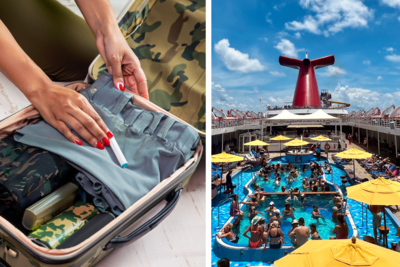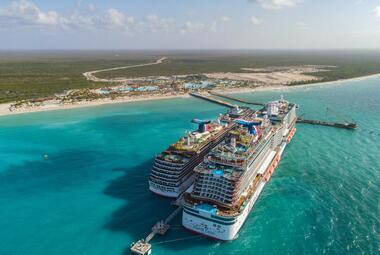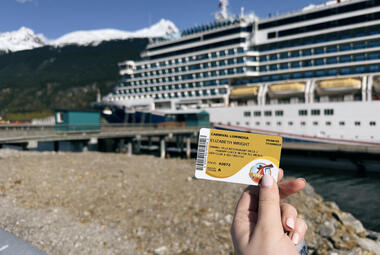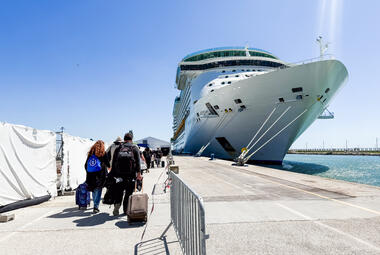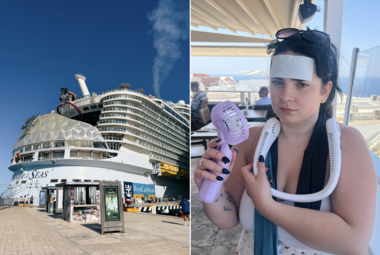When packing for your cruise, you should make sure to review not only what’s allowed onboard your cruise ship, but also the destinations you’ll be visiting. Each cruise line has a long list of prohibited items that are banned onboard their vessels; however, cruise ship passengers are also required to follow local laws and regulations in each port of call.
Bringing prohibited or illegal items onboard or ashore can get you in major trouble with the cruise line and port country. Breaking the law is the last thing you want to do on your cruise vacation, as it could result in an unwanted fine, arrest, or even a lifelong ban from the cruise line.
In particular, cruisers preparing their suitcases should plan to leave behind marijuana and camouflage clothing. Although both of these might be part of your daily routine at home, you will regret packing them in your suitcase for many reasons.
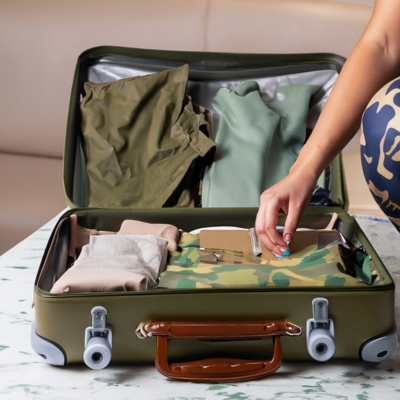
For instance, while marijuana might be legal where you live, it’s prohibited on any cruise ship due to local port and federal regulations. In the same way, although camouflage clothing is allowed onboard cruise ships, camouflage clothing is illegal in many cruise destinations throughout the Caribbean.
Here's why you should absolutely never bring weed or camouflage clothing on your cruise.
Read more: Cruise packing list: What to bring on a cruise
First, marijuana is illegal to bring onboard any cruise ship, regardless of your home country or state’s rules

Marijuana, even for medicinal purposes, is prohibited onboard cruise ships. Even if your home state or country has legalized marijuana, the drug is banned at a federal level. Bringing drugs onboard a cruise ship is strictly prohibited, along with being illegal.
This also means that CBD oil, gummies, oils, and other forms of the drug are banned. You will not receive any sort of exception from a doctor. Cruise lines specify that even medical marijuana is considered prohibited.
For example, Carnival Cruise Line states, “Carnival recognizes that some states in the U.S. have legalized the use of recreational and/or medical marijuana. However, cruise lines are required to follow U.S. federal law, which strictly prohibits possession and use of marijuana and other illegal substances. Consequently, marijuana, including marijuana for medical purposes is not allowed on board.”
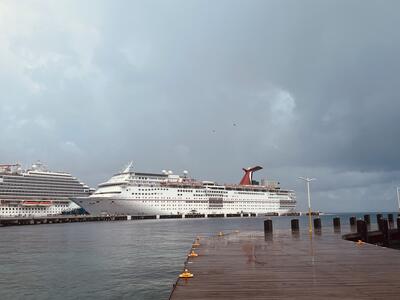
In addition, cruise terminals are considered federal facilities and are, therefore, designated as drug-free zones. Cruise lines have a zero-tolerance policy for narcotics, including marijuana. To aid in assistance, many cruise lines have looked to narcotics-sniffing dogs both in cruise terminals and onboard ships to help identify passengers violating the policy.
Read more: 17 Things You Should Never Do on a Cruise Ship
Cruise lines are cracking down on passengers violating drug policies with fines and lifelong bans

In November 2023, one passenger from Texas attempted to bring CBD gummies in her suitcase on a Carnival cruise. When the port security flagged her suitcase during check-in, the cruise line found a sealed pack of CBD gummies in her bag.
Melinda Van Veldhuizen, a nurse practitioner and chiropractor, told the Washington Post, “I was… freaking out because I don’t even have a parking ticket. I follow the rules.”
The passenger was allegedly detained for hours before being ultimately denied boarding. According to USA Today, the passenger later received a letter stating that she was banned for life from Carnival Cruise Line for violating the ship’s rules and interfering with the safety of other guests.

Supposedly, Carnival Cruise Line did not refund the passenger’s cruise fare, which cost $1,700 for her family to sail on the cruise. The cruise line did later refund the guest’s booked excursions and her portion of the cruise fare.
Other recent headlines brought to light the same issue onboard one Royal Caribbean cruise ship. TikTok user @infamousxdrew shared to followers that he was getting kicked off his cruise ship for getting caught with medicinal marijuana. Mariner of the Seas’ security team supposedly asked the passenger to disembark during the cruise while the ship was docked in Jamaica, so he was unable to finish his round-trip cruise.
Earlier this year in June 2023, Carnival Cruise Line also deployed more drug-sniffing dogs in a stance against banned drugs. The cruise line communicated to guests that there would be more frequent use of the narcotics-sniffing dogs in cruise terminals.
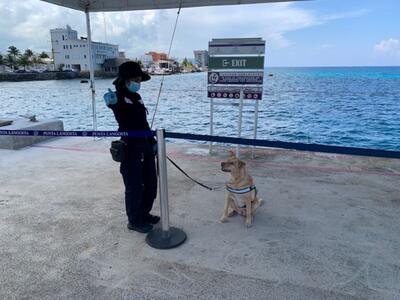
Carnival Cruise Line reminded guests that the K-9 unit was an integral part of the cruise line’s security team to ensure ships are following federal law. In addition, guests can be fined up to $500 per violation, along with other serious consequences such as getting kicked off sailings or banned for life.
Marijuana is illegal onboard but what about cigarettes?

Smoking is allowed on most cruise ships, albeit just in specific areas. While you won't be able to light up in your stateroom, you are usually allowed to smoke in the casino when actively playing or on a designated deck on the top of the ship.
If you're caught smoking where it's prohibited, it is likely that your onboard account will be fined. On Carnival Cruise Line, for instance, they state that each occurrence is subject to a $500 cleaning fee.
Moreover, according to Celebrity Cruises' website, "Smoking is not permitted inside any stateroom or on any stateroom balcony...Smoking is also not permitted in any dining venue, theater, bar, lounge, hallway, or elevator; on the jogging track; or in most other indoor areas."
"Furthermore, smoking is not allowed in certain outdoor spaces, including restricted areas, food venues, and kids play areas and pools. If a guest is in violation of this 'No Smoking' policy, a cleaning fee [of $250] will be applied to their onboard account."
Read more: Can you smoke on a cruise ship?
Just as marijuana is illegal onboard and ashore during your cruise, you should refrain from packing camouflage clothing too
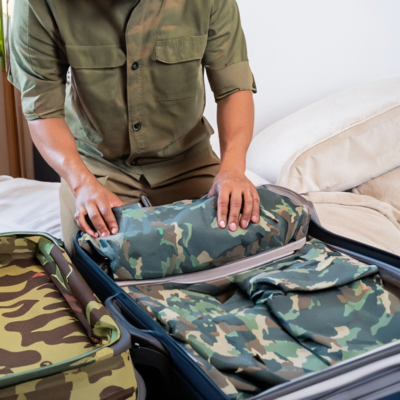
Packing for your cruise can already feel a little daunting with formal nights, excursions, and everyday attire. It can be easy to forget, but you should refrain from packing camouflage clothing for your cruise. This is because some countries reserve the camouflage pattern only for government officials or military members.
Some countries in the Caribbean, Asia, Africa, and the Middle East have banned camouflage clothing and reserve the pattern only for military or government officials. If you’re someone who likes to wear camp-patterned clothing, you should confirm that destinations on your cruise do not have any laws about wearing camouflage.
Countries that have banned camouflage include:
- Azerbaijan
- Antigua and Barbuda
- Bahamas
- Barbados
- Dominica
- Ghana
- Grenada
- Jamaica
- Nigeria
- Oman
- Philippines
- Saint Lucia
- Saint Vincent and the Grenadines
- Saudi Arabia
- Trinidad and Tobago
- Uganda
- Zambia
- Zimbabwe
Last month, Carnival Cruise Line responded to one guest illegally wearing camouflage in Barbados
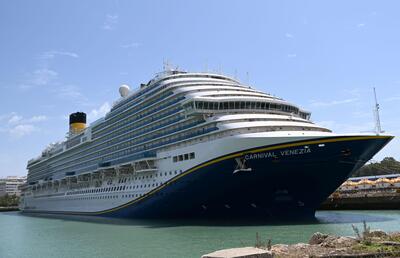
While cruise lines warn against wearing camouflage, many cruisers are still caught off guard by local laws in the Caribbean. One recent incident occurred during a Southern Caribbean itinerary onboard Carnival Venezia prompted Carnival Cruise Line’s brand ambassador, John Heald.
In the apparent incident, one guest was brought back to the ship while it was docked in Barbados by local authorities. The guest claims the Barbados police escorted him back to the ship because of his camouflage backpack.
Other guests onboard stated that Carnival provided notice in the daily newsletter, warning guests not to wear camo because it was illegal in Barbados. Other reminders were made by the cruise director and onboard shore excursion staff about the local laws.
John Heald responded to the incident stating that Carnival would consider adding some sort of notice for ports of call with laws against wearing camouflage. The brand ambassador for Carnival Cruise Line also reminded guests that it was best to leave any camouflage clothing at home to prevent these incidents from happening.
What happens to cruise ship passengers wearing camouflage clothing in a country where it’s prohibited?

Although you can wear camouflage onboard your cruise, this does not apply to all Caribbean destinations. If you choose to wear camo illegally in a port of call, you won’t be getting in trouble with just the fashion police. Each country with laws against camouflage has their own set of policies, some more strict than others.
On Royal Caribbean’s website, the cruise line states, “Please note camouflage print clothing and accessories, as well as military-style clothing, is illegal in Antigua, Barbados, Grenada, Jamaica, St. Lucia, and Trinidad and Tobago. This style of clothing is reserved only for members of the military at these destinations.”
Wearing camouflage clothing in a country that prohibits the pattern could mean that you get charged with hefty fines or even arrested. Since you’re breaking the law, your punishment would be subject to local laws. For one Carnival guest last month, illegally wearing camouflage in Barbados resulted in local police escorting the guest back to the ship.
In addition, you will also likely need to part ways with your camo clothing if you’re caught wearing the forbidden pattern. You can expect that authorities will force you to remove the camo clothing or accessories. As with any cruise, it’s important to review the local laws and customs before boarding your cruise ship.
Read more: 15 Packing Tips for First-Time Cruisers (2024)
Why do certain countries ban wearing camouflage clothing?

Different countries have varying laws for a variety of reasons regarding camouflage clothing. Camouflage clothing has long been associated with military organizations, as it’s a quick way to differentiate civilians and service members. When you see someone in camouflage attire, most will become obedient and treat the individual with respect.
Therefore, most of the time, wearing camouflage is illegal because the pattern is reserved only for members of the military or government. Governments do not want there to be public confusion between members of the military and civilians.
Some countries have banned camouflage because there is a particular fear of confusion, rebellion, and terrorism. Others have implemented such laws to ensure there is no confusion about who is a member of the military or not. For example, Barbados stated that laws were in place so civilians could not pose as members of the military.
Moreover, some countries have chosen to create laws surrounding camouflage clothing because of historical uprisings or crime waves. Take for instance Jamaica, which is one of the countries in the Caribbean that has banned camouflage clothing by civilians. The country has banned camo clothing since the law was enacted during World War II in 1942, and the law remains active today.


